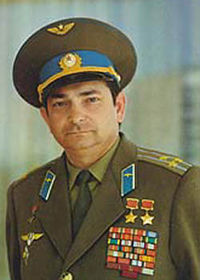Vostok 5
Vostok 5
Восток-5 |
Mission insignia
 |
| Mission statistics |
| Mission name |
Vostok 5
Восток-5 |
| Spacecraft type |
Vostok 3KA |
| Spacecraft mass |
4,720 kg (10,400 lb) |
| Crew size |
1 |
| Call sign |
Ястреб (Yastreb - "Hawk") |
| Booster |
Vostok 8K72K |
| Launch pad |
Gagarin's Start, Baikonur Cosmodrome[1] |
| Launch date |
14 June 1963 11:58:58 (1963-06-14T11:58:58) UTC |
| Landing |
June 19 1963 11:06 (1963-06-19T11:07) UTC |
| Mission duration |
4d/23:07 |
| Number of orbits |
82 |
| Apogee |
131 km (81 mi) |
| Perigee |
130 km (81 mi) |
| Orbital period |
87.1 minutes |
| Orbital inclination |
64.9° |
| Crew photo |
 |
| Related missions |
|
|
Vostok 5 (Russian: Восток-5, Orient 5 or East 5) was a joint mission of the Soviet space program together with Vostok 6; as with the previous pair of Vostok 3 and Vostok 4 the two Vostok spacecraft came close to one another in orbit and established a radio link.
Cosmonaut Valery Bykovsky was originally intended to stay in orbit for eight days, but the mission details changed many times due to elevated levels of solar flare activity at the time and he was eventually ordered back after five days. This remains today the record for solo manned flight in earth orbit.
A problem with the spacecraft's waste collection system is reported to have made conditions "unpleasant" in the capsule. The only other difficulty encountered was that, like on Vostok 1 and Vostok 2, the re-entry module failed to separate cleanly from the service module when it was time for Bykovsky to come home.
The re-entry capsule is now on display at the Tsiolkovsky Museum in Kaluga.
Crew
| Position |
Cosmonaut |
| Pilot |
Valery Bykovsky
First spaceflight |
Backup crew
| Position |
Cosmonaut |
| Pilot |
Boris Volynov |
Reserve crew
Mission parameters
References
|
Vostok programme |
|
| Unmanned: |
Korabl-Sputnik 1 · Vostok-1K No.1 · Korabl-Sputnik 2 · Korabl-Sputnik 3 · Vostok-1K No.4 · Korabl-Sputnik 4 · Korabl-Sputnik 5
|
 |
|
| Manned: |
|
|
| Cancelled: |
|
|


